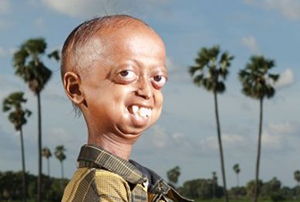 Ali Hussain Khan ages eight times faster every year from the condition, which has already killed his five brothers and sisters
Ali Hussain Khan ages eight times faster every year from the condition, which has already killed his five brothers and sistersHeartbreakingly, he’s also the last surviving child of SIX siblings hit by a rare, crippling ¬and incurable disease.
But despite suffering such a terrible loss, brave Ali refuses to give up hope a miracle cure will be found so he will reach adulthood.
Ali was born with progeria, a ¬genetic condition that ages his body eight times faster than normal.
There are only 80 known cases of progeria on the entire planet.
Yet Ali, his two brothers and three of his sisters had the condition, which ¬usually kills victims by the age of 14 with a heart attack or pneumonia.
But Ali refuses to give up hope a miracle cure may be found, even though he knows his life could end any moment.
He told the Sunday People : “I very much want to live and I hope there is medicine for my disease out there.
“I’m not scared of death but my parents have suffered a lot.
“I’d love to live much longer for them. I don’t want to burden them with any more pain.”
Dad Nabi Hussain Khan, 50, and mum Razia, 46, from Bihar – the poorest state in India – are first ¬cousins who were the product of an arranged marriage 32 years ago.
When their first daughter Rehana was born in 1983 they had no idea anything was wrong.
It was only after her second birthday when she couldn’t eat or walk properly they visited a local doctor.
But he was baffled and sent them home with a useless medicine.
They went back to the doctor after their son Ikramul was born in 1987 showing the same symptoms – and got the same reaction.
Nabi, who earns £20 a month as a factory guard, said: “The doctors were as clueless as us.
“If one of them had told us our children had some kind of genetic problem and we were connected we’d have stopped having children.”
Daughters Gudiya and Rubina were born in 1989 and 1992, Ali arrived in 1999 and a newborn baby boy died. All had progeria.
But the couple also had unaffected children – Sanjeeda and her sister Chanda are now 20 and 10.
Nabi and Razia only found out about progeria in 1995 after seeing an expert – who told them it was ¬incurable.
Nabi said: “No one in our community ¬believed it.
“Neighbours and extended family tormented us for not getting help for the children – they just couldn’t ¬understand a disease with no cure.”
Meanwhile, life was unbearable for Rehana, Ikramul, Gudiya, Rubina and Ali as they grew up with progeria.
They were ridiculed and bullied till none of them went to school.
Ali, who weighs just 1st 8lbs and is 3ft 7in tall, said: “None of us has had a childhood because we were confined to home.
“We had each other but that was it – we had no life.”
He added: “I’d love to be a normal person who can play, go to school, do some sports, take some risks.”
Gudiya and Rubina both died in 2004 aged 15 and 12. Rehana died three years later aged 24.
But 22-year-old Ikramul’s death in 2009 hit Ali hardest.
He said: “Ikramul was my best friend. He was very strong and didn’t pay any attention to the bullies.
“When he died I cried for weeks and couldn’t eat. But I realised I’d do him a huge injustice if I crumbled.” He added: “I have no one now – but I have to stay strong.
“It’s very lonely living this life since my siblings have gone.
“I’d like to be in the company of others like me again.”
Ali is cared for by expert Dr Sekhar Chattopadyay, who said: “There is nothing similar in the world where five siblings are affected.
“Ali’s parents are related to each other and that could be the reason for the disorder, though they have two children who are normal.
“We’re trying our best to keep Ali mentally and physically fit.
“The average life expectancy is 13 to 15 but let’s hope we can prolong Ali’s to 24 like his brother.”
There are four known cases of progeria in the UK.
They include Birmingham-born Dean Andrews, 21, who is the ¬oldest survivor in Europe.






Comments
Add new comment